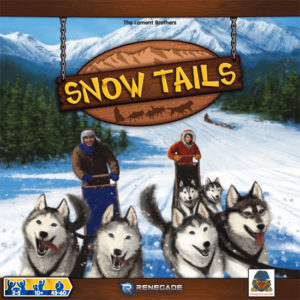 I think of all the games that I play and own, the one genre that I take great enjoyment in playing are racing games. I can remember as a kid all the foot and bike races with friends and family. Winning was great, but I recalling having fun even if I didn’t. As I age and slow, that same enjoyment of racing has moved to the tabletop.
I think of all the games that I play and own, the one genre that I take great enjoyment in playing are racing games. I can remember as a kid all the foot and bike races with friends and family. Winning was great, but I recalling having fun even if I didn’t. As I age and slow, that same enjoyment of racing has moved to the tabletop.
Racing games are a big part of my board gaming life from Camel Up and Road Kill Rally with friends, to Pitch Car and Monza with my kids, these let me still enjoy a good race. Today we look at a unique racing game from Renegade Game Studios called Snow Tails, where you will lead a dog sled against other sleds hopefully to victory. Does Snow Tails keep up with other racing games or does it go off course? Read on!
Snow Tails is a hand management racing game for 2-5 players and plays between 45–60 minutes. Snow Tails plays best with 4-5 players.
Game Overview:
Snow Tails overall theme and objective is straight-forward and unique. You lead a dog sled against other dog sled racers and see who the best is. Unfortunately, the race is set in the Arctic Circle and so your course is made of some unforgiving snow. Racers will be drifting back and forth, trying to stay on the course while avoiding other racers and obstacles to the finish line.
Game Components:
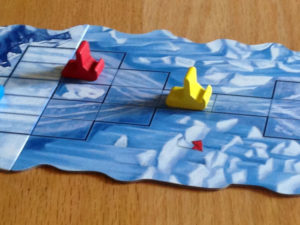
Snow Tails comes with excellent components. All tokens, markers, track pieces, mats, and cards are of quality and will hold up for replay. You should consider adding card sleeves to the Dog and Dent decks. The Dog deck will see the most use and reshuffling during the game. The Dent cards could use sleeves, but it’s not a must have since you will not remove those from your hand once you get them.
I have to say that there are no lows with the game pieces. I love the track pieces because not only do they have excellent detail to show the course and drift lanes, but you get 14 pieces in total, not including the starting and finish line tracks. The number of track plus the fact that each piece is two-sided makes the replay value of this game very high.
The other high point of the components is the dog sled mats. These are key for most players to visualize their sleds movement and it’s not uncommon to watch players move their mats as their token makes turns on the track. This gives players a way keep where they need to drift in perspective of where the token is on the track. Also, the dog cards and brake tokens fit perfectly on the mat. These were well designed and produced.
How to Play:
During set-up, players will choose a course (there’s a starting course for first time players) and collect all of their racing components. The first player places their token on a free starting position and once all players have placed the game begins.
Players will take their turn in race position i.e. 1st, 2nd, 3rd, etc., and each will do the following on their turn turn.
- Play 1-3 Canine Cards from your Dog Deck. A player MUST play at least one card to their Sled Mat and, if they play more than one the cards, those cards MUST be of the same value. A card can be played on top of one from a previous round or over the starting number of the mat. If the card is placed into the discard pile, then a brake marker of the same value replaces the one in play.
- Move your Sled. The sled’s speed is value of the Canine cards on the Sled Mat, added together, and then minus the current brake marker. So, 2 Canine Cards of 3 and a brake marker of 3 would be 3 + 3 – 3 = total of 3 movement. If the Canine Cards are not the same value then the player must drift forward right or left diagonal depending on the difference of the 2 Canine Cards.
- Return Hand Size to 5 Cards. The player should draw Canine Cards up to 5.
Three rules that are important to note: Dent Cards, Safety Speed, and Balanced Sleds. During a player’s movement, a player might collect Dent Cards. These will go into your hand and cannot be discarded. So, if you end up with 5 Dent Cards, your game is over. These cards represent damage to your sled throughout the game and you collect them the 3 following ways: 1. Going off the track, 2. Colliding with Another Sled, and 3. Entering a Corner over the Safety Speed.
Each course will have a Safety Speed noted on the track pieces before a course turn. Think of this like the speed limit for the turn, if you exceed it you will damage your sled and collect a Dent Card for every point over the Safety Speed. If you’re below or at the Safety Speed then no damage to your Sled and so no Dent Cards are collected.
Lastly, during your movement when you have Canine Cards of equal value i.e. 3 & 3 your sled is balanced and you qualify for a movement bonus. The bonus equals your race position. So, if your race position was 3rd your bonus would be +3. This is optional and no drifting is allowed.
Turns will go by in this manner and the first player to cross the finish line wins!
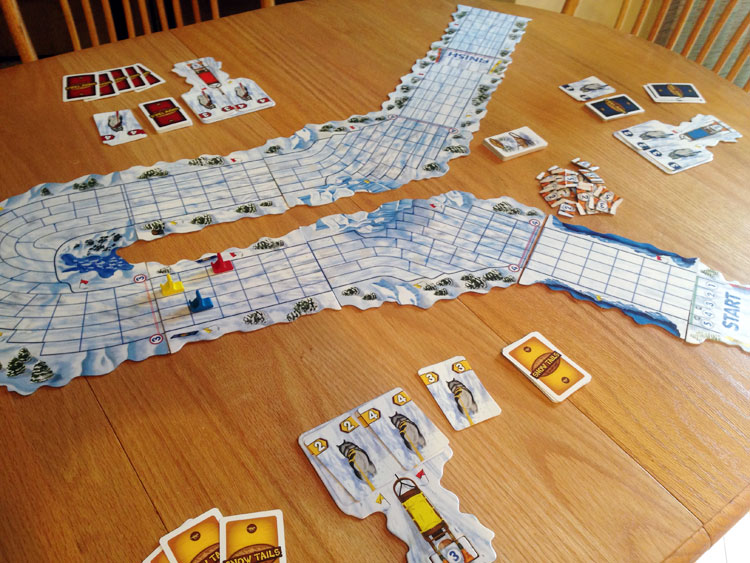
Game Experience:
As I stated earlier, I really enjoy racing games. It’s you against the field and Snow Tails meets this need for me. From the start, this is a fun game that is fairly straight forward and easy to play and master. The rule book is excellent for learning/teaching the game and even comes with a summary on the back cover for high level reference to player’s actions per turn.
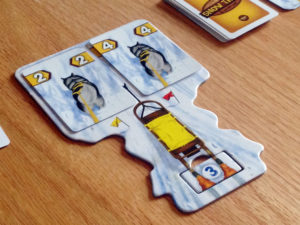
I think the hardest thing for some players to get use to is the drift movement, but after one play you should have this down as well. It only takes one play because players will need to drift to make any turn on the course. Drifting for me is an excellent game mechanic that separates Snow Tails from other racing games because it involves some level of strategy and planning with your movement, instead of simply reacting to the other players and obstacles on the course.
The numbers of two-sided track pieces help the game play on two levels. The first is that the shear number and variety of tiles increases the replay significantly. The rule book includes 7 example courses that you can build that seem to have varying degrees of difficulty. You can also ignore the rule book examples and build your own. The main thing to note is that each piece comes with a red flag on the right and a yellow flag on the left. These are set-up mechanics so as long as you match these up to the same side you can make your course as easy or challenging as you desire.
The second is the back side of most starting straight track pieces will increase the course difficultly. The rules suggest using an easier starting track to familiarize players with the game, which I think that’s rather smart. Ease new players into the game and then throw the dreaded Chasm, Snow Drift, or Sapling tracks later. I like the fact that the track pieces can scale up or down the course difficulty, so you should be able to find a sweet spot for group’s mood.
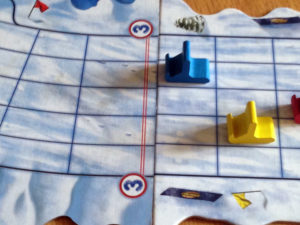
I have to note that this is also a fairly balanced game as well. The identical Dog Decks and the Safety Speed zones are great equalizers throughout the game. So, if you get lower Canine Cards at the start, you’ll definitely get higher ones as you work your way through the deck. The Safety Speeds also keep the playing field balanced because all players need to abide or gain Dent Cards if you exceed the number. If players don’t make too many mistakes, the game should be fairly close. In my group’s experience, most run-aways were from poor planning and mental errors.
This leads me to one aspect of Snow Tails that can be viewed as a negative, low player interaction. Other racing games typically give you mechanics where players interact by foiling other’s actions or movement. Snow Tails only does movement and it’s only if another player is directly in your path. So players only can interact by being an obstacle for another player or sled collisions. To me this gives Snow Tails sort of a Euro feel where most players have little to no interaction. Again, if players like low interaction then this is not a negative. I would prefer more but that’s my opinion.
Final thoughts:
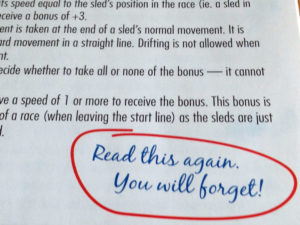
The Renegade Games did a great job creating a well-balanced racing game in Snow Tails. This game seems to try to emulate a true Dog Sled race where player’s race against elements and the course. The rule book is an excellent guide mixed with a bit of humor, with the overall the rules being easy to learn and master.
While it can be somewhat frustrating if you’re not in the lead, the game balance will help you stay in the race. If you want a Death Race with heat-seeking missiles and machine guns, then pass on Snow Tails. While Snow Tails has low player interaction, it does have a high replay value and is fun nonetheless.
If you are interested in getting a copy of Snow Tails you can pick it up for about $30.
Final Score: 4.0 Stars – A good hand management and well-balanced racing game that is easy to learn and play.
 Hits:
Hits:
• Huge replay value
• Well-balanced for players
• Excellent, humorous rule book
Misses:
• Low player interaction
• Not the most exciting theme








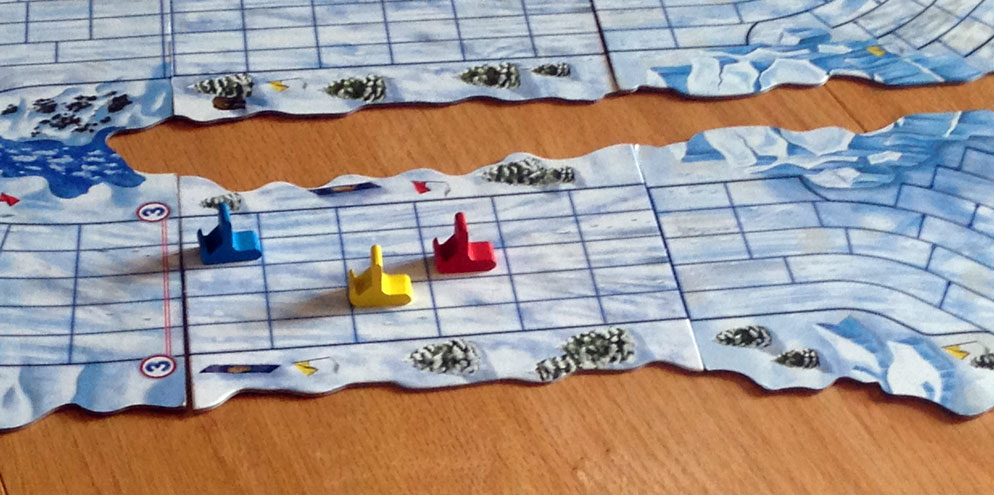















You mentioned you enjoy racing games, what other ones do you recommend?
Hey Ben- I’d recommend the following racing games. 1. Road Kill Rally by Z-Man (this is essentially like the movie Death Race 2000) – this is one of my all-time favorites and has high player interaction. 2. Camel-Up by Z-Man. This has low player interaction but has a great betting mechanic for short and long term bets. These are both in regular rotation with my gaming group. 3. Pitch Car Mini by Ferti- this is a dexterity based racing game where you flick cars around a modular track. 4. The Hare & the Tortoise by iello is not a new game but new to the group and my kids is. This is a light easy to teach and learn one. 5. Monza by Haba- my kids love this one but it’s a little too random at times for me. I think all but Pitch Car are in print.
We enjoy Snow Tails. When we play there is some interaction especially when another player is about to crash into another sled. Love the simplicity of the play but the depth of decisions you need to make. Another nice thing about this game is how it gets peoples attention when it’s set up.